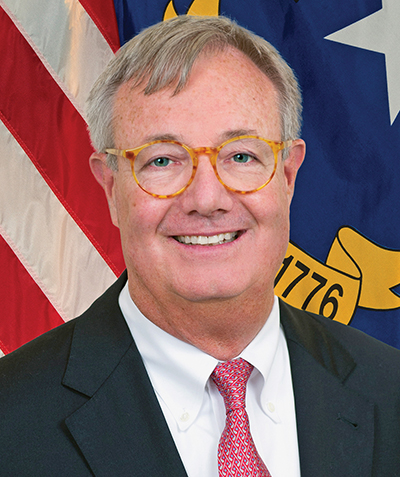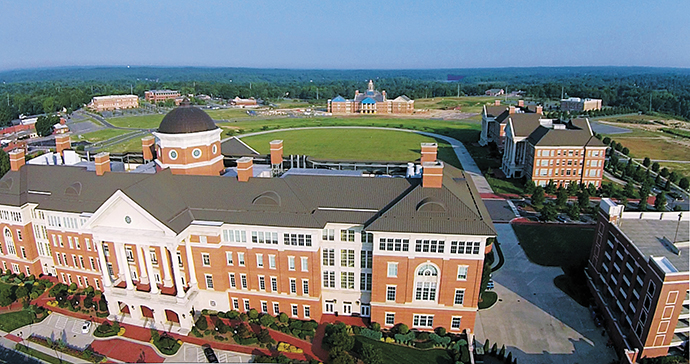What do an innovative research park, a $2-billion infrastructure bond, a proposed $100-million venture capital fund, and a planned CSX intermodal terminal all have in common?
They are part of a plan to elevate North Carolina’s business climate to unprecedented heights.
Already regarded as one of the most competitive business environments in the US, North Carolina has embarked on a public-private investment binge that rivals anything previously attempted in the Southeast.
For a state that ranks as the second best business climate in the nation, according to Site Selection and Forbes, this surge is a reflection of a new state government philosophy focused on widening the competitive gap in the US and attracting even more foreign direct investment.
North Carolina Commerce Secretary John Skvarla, speaking to about 150 business leaders at North Carolina State University in Raleigh on August 18, said that while North Carolina has been the top-performing state economy over the last four years, there’s room for improvement.
“We are continuing to make North Carolina great,” he said, “and that includes investing in our future.”
The $2-billion ConnectNC bond referendum, passed earlier this year, is already making an impact. The first $200-million bond was sold July 27 and is being used to support investment in the state’s educational institutions, parks, National Guard, and water and sewer infrastructure.
Among the projects to be funded will be facilities for teaching STEM disciplines at North Carolina’s four-year public universities and two-year community colleges. The bond also means more money for needed transportation infrastructure.
One of the fastest-growing states in the US, North Carolina recently topped 10 million in population and surpassed Michigan to be the ninth-most-populous state in America.
“At the rate we are growing, we are well on our way to becoming the seventh-most-populous state in a few years,” says Skvarla. “But we also know that we have to do more.”
Wanted: A $100M Venture Fund
To Skvarla, “more” means additional investment into creating seed funds supporting entrepreneurs in the state. “Access to capital is what every entrepreneur must have,” he says. “We have a very robust venture capital program in North Carolina, but it is rich people’s capital. We have a myriad of funding programs in the state that are too disparate. If North Carolina really wants to explode, we need a $100-million early-stage venture fund — $20 million a year for five years. The operational goal is to pay the fund manager and pay the fund back.”
The long-term goal, Skvarla notes, is to “start creating an entrepreneurial state that is giving people access to capital. With the entrepreneurial capability of this state, we can be unsurpassed in the US.”
The numbers tend to bear him out:
- The Tax Foundation this year ranked North Carolina as having the lowest corporate income tax rate in the Southeast (4 percent).
- Ernst & Young last year ranked North Carolina as having the third-lowest state and local business tax burden in the country.
- Chief Executive Magazine this year rated North Carolina the No. 3 Best State for Business.
- Site Selection this year ranked North Carolina the No. 1 State for Workforce Development in the Atlantic Region.
- The US Bureau of Labor Statistics last year ranked North Carolina as having the second-lowest unionization rate in the nation.
North Carolina also appears to be growing the most desirable jobs. According to The Brookings Institution, Raleigh and Charlotte both rank among the top 10 US metros in the overall growth of advanced industries’ jobs from 2013 to 2015. Raleigh ranks No. 6 and Charlotte ranks No. 7.
Charlotte fared even better in a ranking by CBRE. In the real estate firm’s annual research report titled “Scoring Tech Talent,” Charlotte ranked No 1 in the nation as the top “momentum market” based on high-tech talent growth from 2010 to 2015. At a growth rate of 74.7 percent, Charlotte easily beat No. 2 metro Nashville, which grew its tech jobs at a rate of 67.9 percent. Even the highly heralded San Francisco Bay Area lagged Charlotte, coming in No. 3 with a growth rate of 61.5 percent.
Much of North Carolina’s high-tech job growth is occurring as a result of FDI projects. North Carolina generated $2.7 billion and 5,300 new jobs from FDI last year, according to Skvarla, who added that the state is on pace to top that in 2016.
Adjusted for GDP, North Carolina ranks sixth in the US in FDI attraction, with key growth sectors being industrial machinery, food processing, metal products, chemical products, life sciences and aerospace.
‘So Much Better Compared to Europe’
At the 2016 Global Business Conference on International Investment in the Carolinas on August 18 in Raleigh, a number of foreign executives spoke about their experiences in investing in North Carolina.
Nick Adams, global vice president of business development for Ontario, Canada-based Linamar Corp., was involved in his firm’s decision to select a site in Henderson County, North Carolina, for a $200-million aluminum die casting plant for automotive components. The joint venture with Georg Fischer AG is expected to create 350 jobs and go into production in mid-2017.

“We came to a partnership with North Carolina and selected a site in the Asheville area,” Adams said. “Support from the state helped seal the deal. It was amazing. An unemployment rate of below 4 percent in the area was a problem. We had to set up a unique training program with the local college. Money for this is available in North Carolina if you want to use it. We received help in permits and in so many other areas. It was so much better compared to what we face in Europe. The Economic Development Partnership of North Carolina pushed to speed up a lot of things for us during this process.”
Jan-Christoph Schwarck, president and plant manager for KSM Castings USA Inc., led the construction and opening of the company’s transmission parts facility in Shelby, North Carolina, in 2014. The $55-million facility created more than 130 jobs that pay well above the area average.
Recently, KSM announced that it will commit an additional $80 million and hire 80 more workers at the Shelby site. Upon completion, the plant should reach 267 full-time workers.
“Incentives are not that big of a deal in Germany, but they are here in the US,” Schwarck said. “We were able to take advantage of this with our deal in North Carolina.”
Chris Chung, CEO of the Economic Development Partnership of North Carolina, says that “Germany is our largest source of FDI, followed by East Asia, with an emphasis on the Japan market. China, Canada and Korea are targets too. In fact, Korea and India are two of our fastest-growing sources of FDI. We are seeing a lot of deal flow.”
Western Europe continues to be a source of life science investments for the state, adds Chung. “Danish firm Novo Nordisk broke ground on its $1.8-billion expansion, adding 700 new jobs, at its diabetes products plant in Clayton in Johnson County,” he says. “The project is the largest single manufacturing investment in state history.”
Meanwhile, Grifols of Spain announced a $210-million investment into two new plants in Clayton. The bio-therapeutics company will build a new plasma fractionation plant and a purification plant for intravenous immunoglobin.
“Both of these FDI projects affirmed the business climate and the workforce that these companies have here in North Carolina,” says Chung. “Universities draw these companies too. Investments on the public side have ensured a continued pipeline of talent. They are getting workers who understand how to produce bio-pharmaceutical products.”
At the 350-acre (142-hectare) North Carolina Research Campus in Kannapolis on the northeastern outskirts of Charlotte, life science research is combining with work in nutrition science to stimulate not only new investment, but also a whole new city. Launched with a $700-million investment by David H. Murdock, chairman and owner of Dole Food Company Inc., the complex now includes multiple research facilities and a brand new Kannapolis City Hall.
Baseball Park, Arts Hall Planned
Mark Spitzer, vice president of North Carolina operations for Castle & Cooke LLC, the developer of NCRC, says that some 350 scientists and more than 1,000 total workers now populate the campus. “We have a significant research capability that is bolstered by a commitment that we have to the City of Kannapolis and to the residents in the form of workforce development,” he says. “We have a biotech training center underway at the Rowan Cabarrus Community College facility on site and will soon have a second building that will house an advanced technology center under the RCCC.”
Eight universities — including Duke, NC State and UNC-Chapel Hill — have partnered on the NCRC, which also now counts a growing cadre of private investors. Among them are Dole Food, General Mills and Ei. About 880,000 sq. ft. (81,752-sq. m.) of space has been built out since the park’s inception more than a decade ago.

“We are building on the foundation of good nutrition,” says Spitzer. “Stage two of our campus is a continuing growth of our footprint as a research facility and our emergence as a significant disseminator of our research through education and delivering products that meet the targeted nutritional needs of our population.”
The project has been so successful that Kannapolis moved its City Hall to the site and is now partnering with the Development Financial Initiative of the UNC-Chapel Hill School of Government on implementing a master development plan to recreate a whole new city.
The city selected LMG of Fort Lauderdale last month to be the master developer of the project, which will include development of a performing arts center and a baseball stadium in the newly created downtown village. Both will connect to walkways leading to City Hall and the NCRC.
Preliminary estimates show that the city expects private investment in the new downtown village to top $374 million over the next 20 years. In addition, the city would invest some $113 million into infrastructure improvements and public facilities.
“We are taking bold visionary action for the economic health of our city for decades to come,” said Kannapolis Mayor Darrell Hinnant.
On the other side of the state, in the coastal plain region east of Raleigh, CSX announced in July that it would invest $160 million into building the $272-million Carolina Connector intermodal terminal in Rocky Mount. Initially, the CSX facility is expected to process more than 260,000 containers a year.
Projected to open in 2020, the Carolina Connector could create as many as 1,500 new jobs throughout the state, according to NC State University economist Mike Walden.

